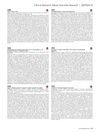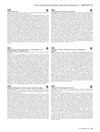 2 citations,
July 2022 in “Cell Regeneration”
2 citations,
July 2022 in “Cell Regeneration” Understanding hair growth involves complex factors, and more research is needed to improve treatments for hair loss conditions.
2 citations,
June 2022 in “Cells” 3D cell cultures are better for testing hair growth treatments than 2D cultures.
2 citations,
June 2022 in “International Journal of Molecular Sciences” Lower levels of certain genes in hair cells improve hair loss treatment outcomes.
 2 citations,
February 2022 in “Biology”
2 citations,
February 2022 in “Biology” Blue laser light reduces energy in mouse skin cells and creates harmful oxygen compounds, possibly harming the cells.
2 citations,
January 2022 in “Anais brasileiros de dermatologia/Anais Brasileiros de Dermatologia” Chemical hair straighteners can cause scalp and hair damage, but long-term effects are unclear.
 2 citations,
January 2022 in “International Journal of Medical Sciences”
2 citations,
January 2022 in “International Journal of Medical Sciences” Kartogenin may help treat hair loss by promoting hair growth and extending the hair growth phase.
 2 citations,
January 2022 in “Skin Pharmacology and Physiology”
2 citations,
January 2022 in “Skin Pharmacology and Physiology” Dexamethasone increases the activity of androgen receptors in human skin cells, which may link it to certain types of hair loss.
2 citations,
August 2022 in “Frontiers in Immunology” Microneedling with betamethasone led to almost complete hair regrowth in severe alopecia areata.
1 citations,
July 2022 in “Frontiers in Pharmacology” Dutasteride may help protect neurons and reduce inflammation in Parkinson's disease.
1 citations,
July 2022 in “Clinical, Cosmetic and Investigational Dermatology” Taohong Siwu Decoction may help treat hair loss by targeting multiple genes and pathways.
1 citations,
June 2022 in “Pharmaceutics” Minoxidil's absorption is too variable for it to be a reliable reference drug.
 1 citations,
May 2022 in “Pharmaceutics”
1 citations,
May 2022 in “Pharmaceutics” Tea seed oil in nanostructured carriers stimulates hair growth and feels less greasy when applied.
 1 citations,
April 2022 in “Regenerative Therapy”
1 citations,
April 2022 in “Regenerative Therapy” Activating the GDNF-GFRα1-RET signaling pathway could potentially promote skin and limb regeneration in humans and could be used to treat hair loss and promote wound healing.
1 citations,
April 2022 in “Journal of Ayurveda and integrative medicine” Blumea eriantha DC extract shows strong potential for promoting hair growth.
1 citations,
March 2022 in “Irish Journal of Medical Science” Men with androgenetic alopecia and hypertension may experience more severe COVID-19.
 1 citations,
December 2021 in “Cureus”
1 citations,
December 2021 in “Cureus” Overweight PCOS patients often have skin issues like acne, but all PCOS patients should get lifestyle advice.
 1 citations,
September 2021 in “Skin appendage disorders”
1 citations,
September 2021 in “Skin appendage disorders” Botulinum toxin injections can help treat common hair loss in men, but more research is needed to confirm this and understand how it works.
 1 citations,
January 2022 in “Cell Biology International”
1 citations,
January 2022 in “Cell Biology International” Changing CDK4 levels affects the number of stem cells in mouse hair follicles.

Certain gene variations and different levels of BDNF and CRH hormones are linked to vitiligo.
 June 2022 in “Frontiers in Medicine”
June 2022 in “Frontiers in Medicine” Acupuncture and moxibustion may help treat hair loss, but more research is needed.
 April 2022 in “Molecules”
April 2022 in “Molecules” Teak leaf extract contains compounds that could help treat hair loss.
 February 2022 in “Mediators of Inflammation”
February 2022 in “Mediators of Inflammation” Women with Polycystic Ovary Syndrome (PCOS) have lower levels of a substance called DIAPH1 in their blood, which is linked to changes in sugar metabolism and insulin resistance.
March 2022 in “Journal of Investigative Dermatology” Discoid Lupus Erythematosus causes scalp plaques that can lead to hair loss, and antimalarial drugs are effective treatments.
May 2022 in “Cardiovascular Toxicology” April 2022 in “Medical Molecular Morphology” March 2022 in “International Journal of Trichology” Smoking may worsen hair loss, but more research is needed.
 1 citations,
April 2017 in “Journal of Investigative Dermatology”
1 citations,
April 2017 in “Journal of Investigative Dermatology” Using a teletriage system greatly increased access to skin care for uninsured Latino immigrants at a clinic.
 April 2017 in “Journal of Investigative Dermatology”
April 2017 in “Journal of Investigative Dermatology” Most patients with cutaneous dermatomyositis either improved or remained stable over 3.5 years.
 April 2017 in “Journal of Investigative Dermatology”
April 2017 in “Journal of Investigative Dermatology” Laser treatment may help with hair growth in some people with frontal fibrosing alopecia, but results vary and the exact way it works is unclear.

Four natural compounds were found to promote hair growth effectively.

















